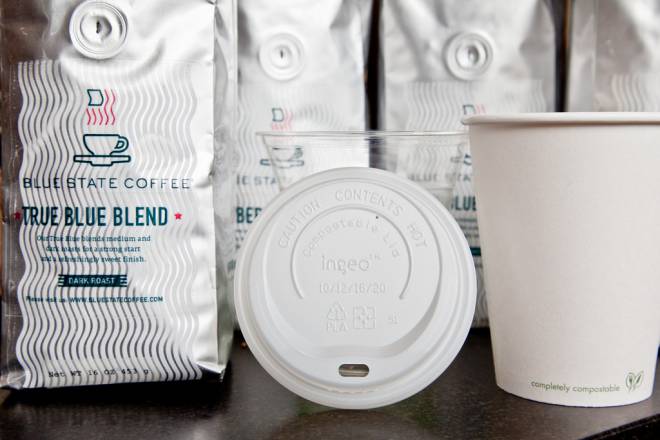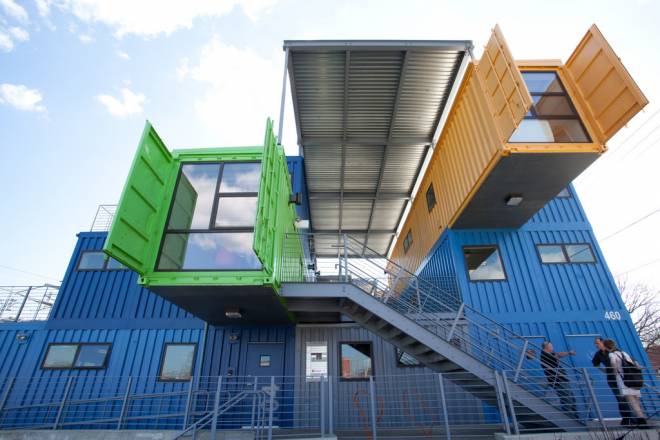1. Small Point Café, on Westminster Street, recycles and composts food scraps. Every week, they fill a 90-gallon container with compostable food scraps. They take the time to separate the recyclables from the non-recyclables. They’re rolling out a new program, called Eternal Sunshine of the Spotless Coffee Cup, which will allow customers to purchase a mug and get cheap refills whenever they come in. This, of course, obviates the need for those pesky paper cups.
2. Blue State Coffee (pictured below), on Thayer Street, is a beacon in the fog when it comes to recycling. They only use compostable or recyclable materials: the cups are made of a corn plastic, the disposable cutlery of potato starch, and the pastry sheets of soy. Alex Payson, the director of coffee for Blue State, estimates that 70-80% of waste is diverted from the landfill. Each day, the store produces between eight and ten gallons of coffee grounds, which are donated to local farmers for compost. Other waste is recycled. Payson says that composting food waste is in the future for their Providence store, perhaps within the next few years.

3. While curbside recycling only works for plastics #1 and #2 at the moment, Whole Foods at University Heights accepts plastic #3 through #7 containers. Yes, this means yogurt containers. Plus, if you eat there, you can toss your food scraps into a composting bin. In a given month, according to Lee Kane, the regional environmental coordinator, the store recycles a ton-and-a-half of paper, three to four tons of plastics and glass, and composts nearly 30 tons of food scraps each month. The materials are sent to a recovery facility in Massachusetts.
4. EcoRI, the seemingly ubiquitous non-profit news organization based in Providence, has the Green Team, which collects compostable food scraps at area farmer’s markets and helps organizers of large events develop a food scrap collection program. To date, they’ve collected over 10,000 pounds of food scraps. The Green Team maintains a compost facility at Hope Artiste Village in Pawtucket. If you’re interested in helping with recycling or composting at your event, call the Green Team. If you’re interested in composting your food scraps, your best bet is to shuffle off to the winter farmer’s market held at Hope Artiste Village every Wednesday from 4-7pm and Saturday from 10am-1pm through May. Bring your eggshells, vegetable scraps and coffee grounds. The service is free, but they would appreciate a $1 donation.
5. If you’re interested in greening your business, the GreenZone is a good place to start. Green Zone, a collaboration between DEM and Rhode Island Resource Recovery Corporation, offers businesses free advice on recycling compliance and meeting environmental goals. This service, according to Alyson Silva of DEM, helps businesses comply with recycling regulations and improve their bottom line. Alyson and David Bordieri, of RIRRC, will help businesses identify opportunities for saving money through waste reduction and recycling. Businesses that excel are recognized through the GreenZone in Action program. In fact, Blue State Coffee has been recognized for their outstanding business recycling program.
6. All of us have at least some of them these days: computers, smart phones, iPads, iPhones, flat screen TVs – all of those gadgets we so love and cherish. Well, be sure not to just toss these items into the trash. The reason for this is good: it’s illegal. Don’t fear though; you have options. The Rhode Island Resource Recovery Corporation operates an E-Waste recycling program. You can take your electronic waste to the landfill anytime during normal business hours. Alternatively, you can either ring the Providence Department of Public Works to schedule a free curbside pickup or simply take your E-Waste to them, at 700 Allens Avenue, where they maintain on-site containers in which to dispose of your old computers and TVs.

7. The Box Office (pictured above), on Harris Avenue, is constructed of 32 recycled steel shipping containers. It provides 12 office units, each of which is 1000 square feet. Josh Brandt, of Stack Design, who served as the construction manager of the project and is headquartered in the building, said that the steel shipping container market is a peculiar one. It’s cheaper to simply build new containers than ship extra ones around the world. As a result, there’s a glut of steel shipping containers sitting around rusting. Rather than simply landfill them, a recent trend, particularly in Europe and in the military, is to use the containers as building materials. "Aesthetic constraints," according to Brandt, have slowed widespread adoption on the East Coast. Any excess steel culled from reshaping the containers was reused in the structure.
8. There are also all those fantastically recycled – or adaptively reused – industrial buildings in Providence that provide fantastic work space. The list is long: 1 Davol Square, Anchor at 42 Rice Street, The Foundry, etc. Arguably the best example of the potential of recycling these old industrial buildings into efficient, modern spaces is the Wolcott Eco-Office, located at 28 Wolcott Street in the Promenade District. The building was completely and utterly renovated by RISD grad John Jacobson. The building, built in 1890 and used as a jewelry factory, is now nearly completely self-sustainable – all of its energy needs are supplied on-site. It houses 8,000 square feet of commercial space. The growing solar energy company Alteris Renewables, now a part of Real Good Solar, makes its headquarters there.
9. Matt Grigsby, a RISD grad, founded Ecolect, a sustainable design firm based in Providence, a few years ago. He’s done some consulting in the industrial design space, but his baby is the firm’s sustainable materials library. Later this spring, Ecolect will be rolling out a new and improved database that will allow designers, engineers, artists and architects to search and spec out materials based on sustainability criteria. For example, folks interested in utilizing building materials composed of recycled material will be able to use this database as a one-stop shop for identifying and sourcing said materials. If you’re interested in sustainable building materials, keep any eye on Ecolect’s website for the new database. It could be an invaluable tool.
10. A couple of years ago a few enterprising RISD students founded Second Life, which is housed in a steel shipping container at 351 South Main Street. Second Life collects art supplies that would have otherwise been landfilled and distributes them to students on a barter system. Instead of buying it or getting it free, people in the RISD community trade usable art supplies for it. While not everyone can take from the space, everyone is encouraged to donate.
Comments
No comments on this item Please log in to comment by clicking here